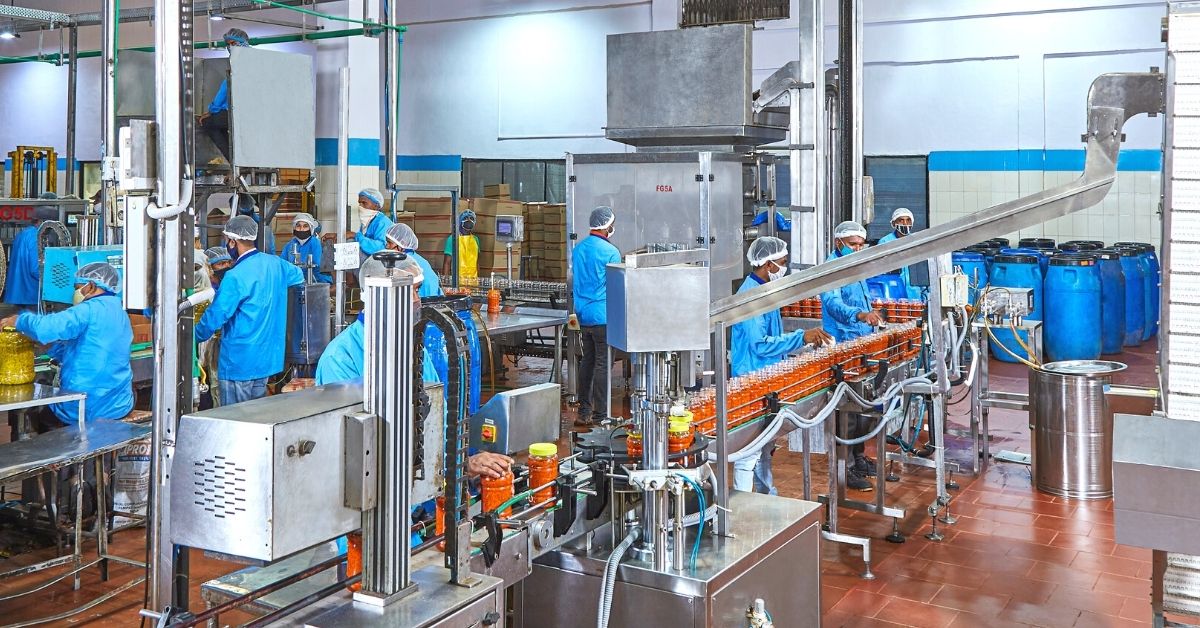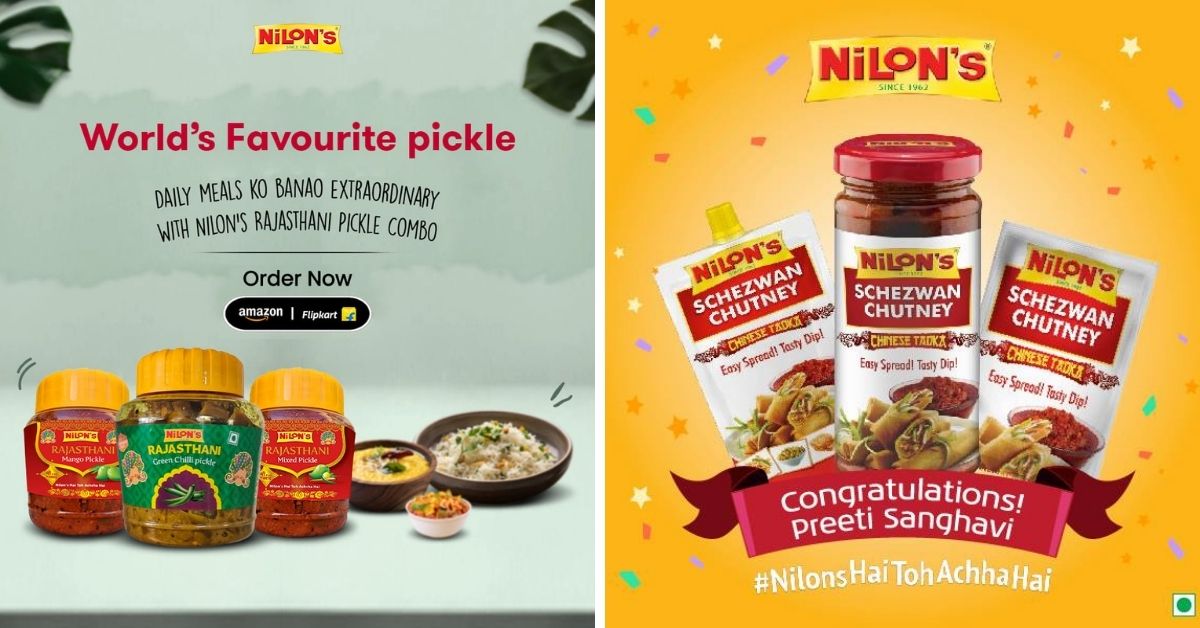“Recently, I was watching Shershaah (2021), the movie based on the life of Captain Vikram Batra. During the scene in which he visits the military canteen to buy alcohol, I noticed something. Though out of focus, the peculiar looking 1-kilo jars of pickle stacked behind the counter were hard to miss,” recalls Gayatri Singh, a resident of Delhi and the daughter of a retired army officer.
Gayatri says she instantly recognised the pickle jars as Nilon’s, a brand with which she shares an unbreakable bond.
“I was always moving to different parts of India owing to my father’s job. The places, schools, friends, the environment and other aspects of my life kept changing, but the only constant companion I had was this pickle glass jar on the dining table,” she recalls.
Gayatri is sure that like her, many families from defence backgrounds can relate to the feeling. After all, it’s this very pickle that put the company on the global map and helped it become the brand that we all love and recognise today.
Despite being a multi-crore entity that has a presence across India today, Nilon’s journey started with humble beginnings.
Dining table doubles up as lab

“My father Suresh Sanghavi and uncle Prafful started the business from a home kitchen in 1962, in Utran village, Jalgaon, Maharashtra,” says Dipak, now managing director and CEO of the company.
The 44-year-old recalls, “In 1962, my father completed his graduation in agriculture, but his elder brother Prafful could not pursue higher education due to the untimely death of their father. He took up agriculture as it was their only source of income and suggested my father implement his newly acquired academic knowledge into agriculture processing,” he says.
He adds that the family understood the potential of food processing due to their earlier experience in the field during World War II. “Our family-owned 1,500 acres of lemon orchard. We produced cordial, lemon syrup and lemon juice for the British and Indian Army to provide immunity and other health benefits to injured soldiers. We also exported a significant amount of the product and earned decent money,” he says.
However, due to the Maharashtra Agricultural Lands (Ceiling on Holdings) Act, 1961, a move implemented by the government to impose restrictions on land holdings, the family lost over 90% of their land. They continued farming on what remained. However, they know that if they could find the right mix of products to cater to customers, they could find a business that took off well.
And so, with their dinner table as their laboratory, the two brothers sourced a variety of produce and began mixing, matching and experimenting with different ingredients. Suresh sourced fresh produce from family-owned orchards to make squashes from pineapple, mulberry, mango and other fruits. Eventually, they began producing jellies, jams, ketchup and other products and sold them under the brand name Nilon’s.
The word was a play on Nylon fibre, which was all the rage at the time as it had just become the world’s first human-made fibre, and was revolutionising industries and lifestyles across the globe.
And so the duo filled their car with the newly-made products and set out to approach potential customers. However, the response they received was inadequate, and the business failed to pick up.

Dipak says his father came up with almost 50 products over the next four years, hoping that some of them would succeed. In 1965, Prafful even asked Suresh whether they should consider shutting down the business after bearing years of losses. However, the latter’s response was firm — losses would be recovered from the same business where investments were made. “There’s no way we will consider another business,” was Suresh’s reply.
And in 1966, when the duo introduced homemade pickles to their collection, things began looking up.
“In those years, the government was inviting tenders for companies to sell their products in military canteens. So the brothers applied for all four varieties of pickles — namely, chilli, mango, mixed, and lemon. The prices were offered at a very competitive rate owing to the business being a small setup. Fortunately, they bagged all the four contracts for the next couple of years,” Dipak says.
However, the contract posed a challenge. “They had never set up a big factory and thereby needed to immediately construct a plant of 7,000 square feet area. They set up the manufacturing unit by seeking loans and began mass production of pickles. By 1969-70, Nilon’s pickle contributed 95% of the total sales, and since then, the company has never looked back,” he adds.
Dipak says that even today, the military personnel he is in touch with hold onto the memories of eating Nilon’s pickle with a sense of nostalgia. “The pickles became part of the lives of multiple generations. We continue to supply our pickles to defence forces to date, but of course, competitors are sharing the space now as well,” he adds.
He says the second product that became a hit was a tutti-frutti candied papaya they started selling. “It was not a category in India then, and companies were experimenting with introducing it in the market. However, one Mansukhbhai from Gujarat, a distributor, visited our factory one day and saw a sample of the product on the office shelf. It had not been launched yet in the market and was under trial. But he decided to experiment by handing these products out at paan shops in Gujarat,” he adds.
The second-generation entrepreneur says that the product gained popularity in the 1970s and can still be found in Wib’s Bread in Mumbai, as well as alongside dessert products of companies like Karachi Bakery, Kwality Walls, Havmor, Nestle, Danone, Vadilal and others.
Not just pickles

However, during the 1980s, the company took a massive hit with their product Njoy, which was launched to compete with the then-popular drink Rasna, a summer refreshment.
“Nilon’s was among 25 other brands trying to compete in that category. But it was not appreciated as expected,” he admits. Sharing his childhood memory, Dipak says, “One day in the month of August-September, I was accompanying my father to a local shop in Jalgaon, where I saw about 50 Njoy packets on a shelf. I told my father that our product is more visible, as others were seen in less quantity.”
To this, Dipak’s father responded by pointing out four packets of Rasna in the corner of one of the shelves. “He showed me that Rasna had sold out by the end of the summer season, and that very customers preferred our product. It was probably my first lesson in business,” Dipak says, adding that the debacle cost the company 25% of its net worth.
Another setback faced by Nilon’s was when Suresh passed away in 2001. “I was pursuing my postgraduate in management when the incident took place, and my uncle mainly managed the farms and did not have much experience with running the business. I took the reins of the business to keep it afloat,” he says.
Dipak says that in 2004, the company boarded Rajheev Agrawal as the CEO of the company who steered the business to increase its value from Rs 8 crore to a turnover of Rs 450 crore today. Nilon’s has three factories, all set up in Jalgaon to guarantee employment for the rural population. It also exports to 30 countries, including the USA, UK, the Middle East, Africa and more.
“Plenty of changes were needed in the products and its diversification. Nilon’s was primarily perceived as a pickle-making company. The distributors and dealers earned marginal amounts from our products. We required a revamp,” he says.
He says that to change the perception of the brand from a pickle company to a food product brand, the company started increasing its product range. It offered food solutions like pasta sauce, pasta masala, Chinese food mixes like Szechuan chutney, sauces and other such products.
“Earlier, customers preferred visiting restaurants that mainly served Punjabi food, and pickles were consumed as an accompaniment. But over the years, customers have started opting for Chinese or continental restaurants where pickles do not find a place. We had to cater to changing tastes and preferences to remain relevant in the market,” he explains.
Walking that extra mile
Dipak says they introduced products like ginger garlic paste and pasta masala to make cooking convenient for homemakers. Citing an example, he says, “A woman in rural India has all the spices and herbs available in her kitchen to prepare a traditional food item. But if her child demands pasta or Chinese food at home, she has no access to those mixes. Our products play a role at this stage, making cooking convenient for all,” he says.”Our products aim to make cooking easier for the youth and millennials as well,” he says.
The phenomenon is evident with the recently released advertisements featuring Bollywood actor Pankaj Tripathi, who plays the character of a gangster who promotes Nilon’s products using humour and catchy dialogues.
“We send a common message, ‘Isme Pyaar Mila Hain,’ which translates to, ‘The product is prepared with love’, across the adverts as we follow it in our manufacturing processes,” he says.
Over the years, the company has adopted multiple technology solutions that conceive products giving authentic taste to the food found in a traditional Indian kitchen. “The ginger garlic paste is made by the same method followed in a traditional mortar pestle. It took years for us to find the machine in the USA that replicated the manual process, ensuring that the flavour and aroma are retained and not vaporised due to the heat produced by machines. Our paste is coarse, unlike a fine paste found in other brands. Even for mixing the pickles, we use a process similar to that of a cement mixer, which does not affect the food quality during the act,” he says.
He adds, “We make our products with love by walking that extra mile and caring for our customers.”
Dipak says the company plans to increase its presence in retail outlets from half a million to four million across India.
He says that for now, he is glad to have been able to continue his family legacy and aims to scale it at new heights. “I can assure you that every employee in the company pours their heart out in making the products to bring the quality they deserve,” he adds.
Edited by Divya Sethu
ReplyDeleteYes! Pickles is really an Indian spicy thing that should be considered. If you are out of India. Then no worries buy from our pickles manufacturing Company and try it out.